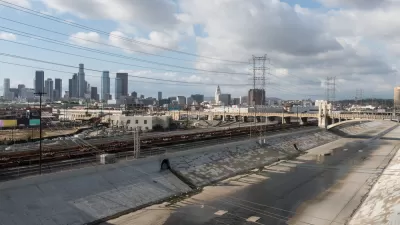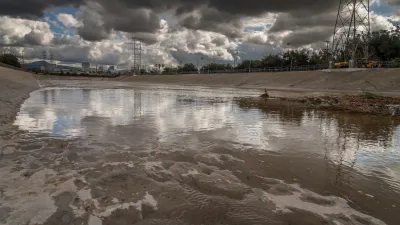Los Angeles has a heat problem, and it's getting worse. But the Mayor's Office is taking on the challenge.

The Los Angeles Office of Sustainability is partnering with local universities on a plan to lower the average regional temperature by three degrees over the next 20 years.
Achieving that goal could reduce energy consumption, improve air quality, and prevent deaths caused annually by extreme heat. The Los Angeles Times looks into how much progress the city needs to make on science and policy to get there.
A variety of factors go into L.A.'s temperatures, but one well-known problem scientists are focusing on is the urban heat island effect: the phenomenon by which cities tend to be warmer than their surrounding areas because of heat absorbed by the built environment.
Over the years Los Angeles has tried, at different scales, a number of common approaches to this problem, including cool pavements and cool roofs, sustainably designed parks, and thoughtful urban forestry.
But because the effects of a heat island can be "hyper-local," its solutions have to be, too—sometimes varying "block to block." In one neighborhood, scientists tested different heat mitigation techniques in a computer model that accounted for every single tree and building.
FULL STORY: L.A.’s mayor wants to lower the city’s temperature. These scientists are figuring out how to do it

Planetizen Federal Action Tracker
A weekly monitor of how Trump’s orders and actions are impacting planners and planning in America.

San Francisco's School District Spent $105M To Build Affordable Housing for Teachers — And That's Just the Beginning
SFUSD joins a growing list of school districts using their land holdings to address housing affordability challenges faced by their own employees.

The Tiny, Adorable $7,000 Car Turning Japan Onto EVs
The single seat Mibot charges from a regular plug as quickly as an iPad, and is about half the price of an average EV.

Seattle's Plan for Adopting Driverless Cars
Equity, safety, accessibility and affordability are front of mind as the city prepares for robotaxis and other autonomous vehicles.

As Trump Phases Out FEMA, Is It Time to Flee the Floodplains?
With less federal funding available for disaster relief efforts, the need to relocate at-risk communities is more urgent than ever.

With Protected Lanes, 460% More People Commute by Bike
For those needing more ammo, more data proving what we already knew is here.
Urban Design for Planners 1: Software Tools
This six-course series explores essential urban design concepts using open source software and equips planners with the tools they need to participate fully in the urban design process.
Planning for Universal Design
Learn the tools for implementing Universal Design in planning regulations.
Smith Gee Studio
City of Charlotte
City of Camden Redevelopment Agency
City of Astoria
Transportation Research & Education Center (TREC) at Portland State University
US High Speed Rail Association
City of Camden Redevelopment Agency
Municipality of Princeton (NJ)





























